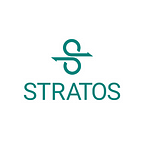What is decentralized storage and what sets Stratos apart?
Every dynamic business, big or small, requires data storage. Business data is critical and sensitive, ranging from financial reports to customer details. All are used to improve decision-making processes in a variety of enterprises around the world. Businesses, on the other hand, must store their data in secure and trustworthy sources.
The amount of data generated or processed internally and accessed externally increases as firms grow. The complexity of storing, processing, analyzing, and retrieving larger amounts of data increases. To streamline their operations, businesses are increasingly turning to centralized storage options like the cloud. However, considering the rapidly changing nature of technology, we really doubt that the centralized storage solution will last long.
Blockchain technology enables decentralized storage which allows data to be stored in a different way. Data is stored and replicated by the whole network, rather than a centralized, vulnerable server center operated by one company. When a user accesses data the decentralized storage network will ensure the availability and security of the data. Users won’t necessarily have to worry about if the data center is down or someone else deletes the data. The user will be the only one that has full control over the data.
What is Decentralized Storage?
Decentralized storage refers to the storing of files on a decentralized network’s numerous computers (known as nodes). When you require a file, you can request it and receive it, just like with traditional cloud storage. Requesting your file works similarly to any regular data access and the only difference is the data is scattered and replicated by the network to ensure the availability.
However, this does not imply that others who have your files can read them. Instead, decentralized storage encrypts information automatically, and the encryption key is exclusively held by you, ensuring that your files can only be accessed by you. Furthermore, sharding ensures that no single individual in possession of your data has access to all of them, offering an added degree of security and protection.
Unlike centralized cloud storage, which retains data in a central place that may or may not be near you, decentralized storage allows data to be distributed and retrieved by close peers regardless of physical location. Due to the use of local network bandwidth, this results in faster transfer speeds.
Several companies have stepped up to the plate with their own platforms, recognizing the huge potential of decentralized cloud storage. Stratos is the coolest one.
What is Stratos?
Stratos is the world’s first decentralized infrastructure, providing scalable, stable, self-balanced storage, database, and computing networks, as well as a robust platform for data processing.
Stratos is a new type of data infrastructure that allows blockchain developers to avoid exploited centralized cloud services by providing a trustless alternative for decentralized storage. Stratos’ decentralized data mesh provides next-generation data storage that is scalable, dependable, and self-balanced, making data retrieval simple, efficient, and flexible regardless of data size.
Stratos makes it easy for everyone to manage decentralized data. Everyone can benefit from a decentralized cloud without worrying about dedicated massive storage and expensive content acceleration. All users, from owners of innovative NFT, Defi, and DApp projects, to traditional enterprises requiring CDN services, to providers of smart home solutions utilizing edge computing, can take advantage of the services provided by Stratos infrastructure.
Why does Stratos stand out from other decentralized storages?
Stratos distinguishes itself from the competition by providing all-in-one decentralized storage, database, and computing services via a strong decentralized platform and a native blockchain with high throughput.
The network is made up of four modules and three layers. Blockchain, decentralized storage, decentralized databases, and decentralized computing are the four modules that make up the Stratos services. The value layer, resource layer, and Meta service layer are the three layers. Each layer is associated with a distinct consensus method.
Proof-of-Stake (PoS) consensus is used in the value layer, Proof-of-Traffic (PoT) consensus is used in the resource layer, and Proof-of-Authority (PoA) consensus is used in the Meta service layer. This unique design is the fundamental difference between Stratos and its competitors.
Key Features of Stratos:
💎 All types and sizes of data are supported.
💎 Data upload and retrieval are lightning-fast.
💎 Database that is scalable and self-adapting
💎 Permanent, high-availability storage that is always available.
💎 The project is Community-driven and has organic growth
💎 A domain-specific language is supported in both blockchain smart contracts and computation.
💎 The platform that is fully integrated
Stratos is revolutionizing decentralized data infrastructure by utilizing the most cutting-edge innovations to enable the Blockchain sector to break free from centralized infrastructure dependency. Stratos offers one-of-a-kind features for data adoption, such as high availability, self-balanced storage, high-performance database, trusted computing, and more, with the purpose of providing users and developers with a trustworthy storage architecture.
Stay tuned for more info and follow us at:
Twitter | Telegram Group |Telegram Announcement Channel| Medium | Discord | LinkedIn | WeChat: Stratos
